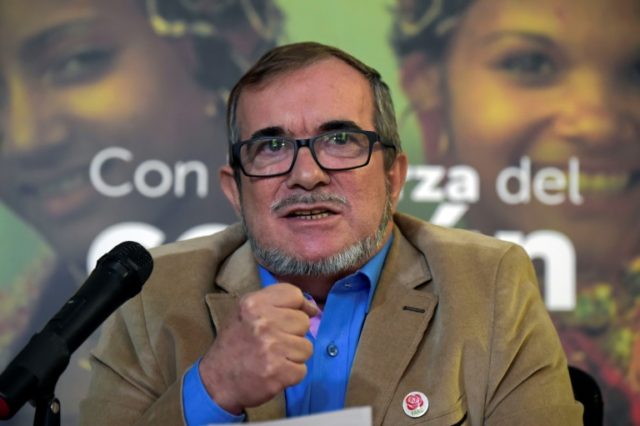The Marxist FARC terrorist group, now a legalized political party, announced its withdrawal from the Colombian presidential race on Thursday following its leader and presidential candidate, “Timochenko,” suffering a heart attack.
As his recovery would take “several weeks,” the group said, and the election is scheduled for Sunday, it would be unfeasible for him to participate.
The Revolutionary Armed Forces of Colombia (FARC), now re-branded as the “Common Alterative Revolutionary Force” political party, received the privilege of participating in March’s presidential and legislative elections through a “peace deal” with President Juan Manuel Santos, who won the Nobel Peace Prize for the effort. Despite constitutional guarantees in place to prevent such a deal passing without a popular vote, Santos pushed the deal through Congress after Colombians voted “no” in a 2016 referendum on legalizing the terrorist organization.
“Widely known circumstances involving the recovery process of our candidate Timo, following a surgery yesterday [Wednesday] … have led us to withdraw our presidential aspirations,” FARC spokesman “Iván Márquez” told reporters on Thursday (FARC terrorists typically adopt a nom de guerre, which most have continued to use in their political lives).
Márquez stated that “Timochenko,” whose real name is Rodrigo Londoño, was experiencing a “satisfactory” recovery from open-heart surgery and that the FARC would continue to campaign in legislative elections, but not replace “Timochenko” with another candidate.
He did not say whether the FARC would endorse one of the remaining candidates in the race.
“Timochenko” posted a message on Twitter confirming that he had opted out of the presidential race, stating that his terrorist group’s “commitment to peace and the common people” was “unshakeable.”
Santos responded to the news by stating he was “very happy” that “Timochenko”‘s heart surgery went well and called the decision to withdraw “understandable.”
Santos’ peace deal does not only allow the group to participate in elections, but guarantees them ten uncontested seats in Congress. Márquez will take one of them, Colombian newspaper El Tiempo reports, expected to take a seat in the Senate. Márquez served as chief negotiator of the peace deal while he and “Timochenko” were exiled in Havana, prior to being absolved of decades of criminal terrorist activity and allowed to return to the political stage at home.
Márquez, real name Luciano Marín Arango, served as a congressman in the 1980s, according to El Tiempo.
The FARC is responsible for the deaths of at least 200,000 people and disappearance of 100,000 others, in addition to an untold number of forced abortions, many on female child soldiers raped by older terrorists. It is also heavily involved in cocaine trafficking and maintains ties to the Shiite terrorist organization Hezbollah. The group remains a U.S.-designated foreign terrorist organization despite its legalization in Colombia.
Its murderous rampages in the past half-century have also made the FARC extremely unpopular at home. “Timochenko” was polling at about one percent with likely voters before he suffered a heart attack last week. The FARC announced they would cease campaigning at all last month after crowds greeting “Timochenko” by hurling garbage and rotten eggs at him at multiple campaign stops.
In addition to canceling campaign stops, FARC officials condemned the Colombian government for not “providing guarantees” against public dissatisfaction with their organization.
Colombian presidential election polls taken this month show conservative Iván Duque of the Democratic Center party maintaining his place as a frontrunner, but stuck in a “statistical tie” with leftist Gustavo Petro of the Human Colombia party, according to El Tiempo. A poll by the firm CM& released Thursday shows Petro at 21 percent and Duque at 18 percent, with several other candidates trailing. 16 parties have fielded presidential candidates in this election.
If no candidate receives a majority of the vote, as occurs in many Latin American countries, the top two candidates will go to a run-off vote in July.

COMMENTS
Please let us know if you're having issues with commenting.